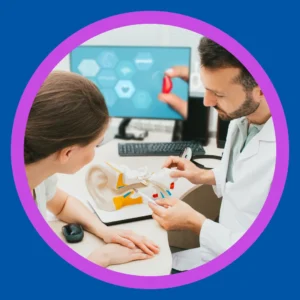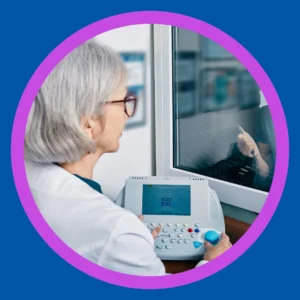Finding the Best Audiologist Near Me
Looking for the best audiologist near me can feel daunting. You may have dozens of options in your area, but how do you know which one is right? Choosing an audiologist is not just about convenience, price, or even the latest technology. It’s about finding a professional who will partner with you in your hearing health for years to come.
Hearing care is deeply personal. It shapes how you connect with loved ones, excel at work, and enjoy everyday moments. Untreated hearing loss can lead to strained relationships, communication challenges, and even cognitive decline. In fact, research shows that early and effective hearing care can improve communication, reduce feelings of isolation, and enhance overall well-being.
The right audiologist will help you navigate the latest devices, customize your treatment, and support you through every stage of your hearing journey. At Stanford Hearing, patients not only receive thorough evaluations but also gain insight into the latest features available in hearing aids so they can make informed choices.
This guide will show you why your choice of audiologist matters, the five must-have qualities to look for, where to search, questions to ask, and how to maintain your hearing health long-term.

Why Choosing the Right Audiologist Is So Important
Many people focus heavily on choosing the “perfect” hearing aid. They read reviews, watch videos, and compare specifications. But they spend very little time researching their provider. That’s a mistake. Even the most advanced hearing aid can underperform if it’s not fitted, programmed, and maintained by a skilled audiologist.
A great audiologist offers far more than a hearing test. They understand your listening environments, your work demands, and your personal goals. They make sure your technology works for you — not just in the clinic, but in real-world situations.
Consider the difference between someone who simply sells you a hearing aid and someone who follows up, makes adjustments, and helps you troubleshoot issues. The first may give you a device. The second gives you better hearing and a better quality of life.
Five Essential Qualities of the Best Audiologist Near Me
When searching for a provider, focus on these five qualities. They will tell you more about your future care experience than any single review or advertisement.
1. Expertise with a Commitment to Lifelong Learning
Audiology is a fast-moving field. New diagnostic tools, treatment methods, and device technologies emerge every year. The best audiologists stay ahead of these changes by attending conferences, pursuing continuing education, and studying the latest clinical research.
Why it matters:
Your needs today may not be your needs five years from now. A provider who keeps learning will be ready to adapt your care plan and recommend new technology when it truly benefits you. They can also guide you through innovations like AI-powered hearing aids or advanced tinnitus treatments.
What to look for:
- Professional credentials such as Au.D., CCC-A, or BC-HIS
- Evidence of regular training and certification updates
- Knowledge of multiple hearing aid brands and models, not just one manufacturer
Example:
Imagine visiting an audiologist who last updated their training five years ago. They may not know about the latest rechargeable models or Bluetooth connectivity improvements. Now picture one who attends annual training and reads industry journals — they can explain why a model with artificial intelligence noise reduction may give you clearer speech understanding in restaurants, even if you have severe hearing loss.

2. Strong Communication Skills
Hearing care is not just about technology — it’s about understanding. A great audiologist explains every step of your journey clearly, without overwhelming you with jargon.
Why it matters:
If you leave your appointment unsure about your diagnosis or how to use your hearing aids, you’re less likely to follow through with care. Good communication ensures you can make informed decisions and use your devices effectively.
What to look for:
- Willingness to answer every question you have
- Ability to explain results and recommendations in plain language
- Use of visual aids or demonstrations when teaching device care
Example:
You’re fitted with new hearing aids. Instead of handing you a quick instruction sheet, your audiologist walks you through cleaning and storing them, lets you practice inserting and removing them, and checks that you feel confident. That level of communication prevents frustration later.
For more preparation tips, see questions to ask during a hearing consultation.
3. Problem-Solving Ability
No two patients are alike. The best audiologists recognize this and adapt when the first solution isn’t perfect.
Why it matters:
Hearing challenges can be complex. Even after a fitting, you might struggle in certain situations, such as noisy family gatherings or conference calls. A problem-solving audiologist will analyze what’s happening, run additional tests if needed, and adjust your care plan.
What to look for:
- Willingness to reprogram or replace devices if needed
- Ability to troubleshoot issues methodically
- Access to a variety of hearing aid accessories and assistive listening devices
Example:
You return after two weeks with your new hearing aids, explaining you still can’t hear well in your book club meetings. Instead of suggesting you “get used to it,” your audiologist tests the devices in a simulated noisy setting and adjusts the microphone settings for group conversations.
4. Precision and Attention to Detail
Fitting hearing aids is both a science and an art. Precision ensures that every setting is optimized for your hearing profile, comfort, and real-world needs.
Why it matters:
A small error in programming can mean the difference between hearing your grandchild’s voice clearly and missing half the conversation. Detailed fittings — including real ear measurement — make sure your devices deliver exactly the right amount of amplification across all frequencies.
What to look for:
- Use of best-practice fitting protocols
- Careful listening to your feedback during adjustments
- Thorough follow-up after your initial fitting
Example:
An audiologist measures your hearing aid output in your ear canal rather than relying on factory settings. This ensures that amplification matches your specific hearing loss pattern, leading to clearer, more natural sound.
5. Genuine Compassion and Patience
Hearing loss can be emotional. The best audiologists understand this and create a safe, supportive space where you can ask questions, express concerns, and move at your own pace.
Why it matters:
Compassion builds trust. Patience allows you to fully adapt to your new hearing aids and treatment plan without feeling rushed.
What to look for:
- A welcoming attitude from your first call to your last appointment
- Willingness to repeat instructions without frustration
- Interest in your personal communication goals
Example:
You call with a minor concern about how your hearing aids feel in your ears. Instead of suggesting you wait until your next appointment, your audiologist invites you in for a quick adjustment, ensuring you stay comfortable and confident.
Where to Find the Best Audiologist Near Me
The search should start with trusted recommendations but also include your own research:
- Ask friends and family for names of providers they trust.
- Consult your physician for referrals to experienced clinics.
- Use professional directories like the American Academy of Audiology’s search tool.
- Check local universities with audiology programs for teaching clinics.
- Look on community forums such as Facebook, Reddit, and Nextdoor for local feedback.
When reading reviews, look for recurring praise for qualities like thoroughness, kindness, and effective follow-up. Be cautious of reviews that are overly vague or emotionally charged without details.
Questions to Ask Before Booking
Going into your first appointment prepared can save you time and stress. Key questions include:
- What is your experience with my specific hearing challenge?
- Which hearing aid brands and technologies do you recommend?
- Do you offer unbundled pricing?
- How do you approach follow-up care?
- What payment plans or insurance options do you offer?
These questions help you assess both the provider’s expertise and their willingness to tailor care to your needs.
Red Flags to Avoid
Certain signs should make you think twice:
- Heavy sales pressure for one specific device without explanation
- Unclear or hidden costs
- Limited testing before recommending devices
- Short, rushed appointments
- Staff who are unhelpful or unprofessional
Beyond Hearing Loss: The Full Scope of Audiology Care
The best audiologist near me may also offer services such as:
- Tinnitus management using sound therapy and counseling
- Balance disorder testing to help with dizziness or vertigo
- Auditory processing evaluations for people who struggle to understand speech despite normal hearing tests
- Custom hearing protection for musicians, swimmers, and people in noisy work environments
- Hearing loss prevention education for long-term ear health
For insight into how untreated hearing loss affects daily life, see 5 ways untreated hearing loss interferes with relationships.
The Role of Hearing Aid Technology
Once you’ve chosen the right provider, you can explore the technology that will work best for you. Modern hearing aids may offer:
- Rechargeable batteries for convenience
- Bluetooth streaming for calls and media
- Artificial intelligence noise reduction for clearer conversations
If you’re unsure where to start, consider scheduling a free hearing test to determine your needs before reviewing device options.
Maintaining Hearing Health Long-Term
Your relationship with an audiologist is ongoing. Expect:
- Routine hearing evaluations
- Adjustments to your devices as needed
- Education on protecting your hearing in noisy environments
- Support for new challenges over time
This ongoing care keeps your hearing — and your quality of life — at its best.

Take the First Step Toward Better Hearing
The search for the best audiologist near me is about more than convenience. It’s about finding a professional who combines expertise, clear communication, problem-solving, precision, and genuine compassion. When you have the right partner in your hearing health, you gain more than devices — you gain confidence, connection, and the joy of hearing life clearly again.
If you’re ready for hearing care that’s personal, thorough, and built for your long-term success, contact Stanford Hearing today to schedule your appointment.
